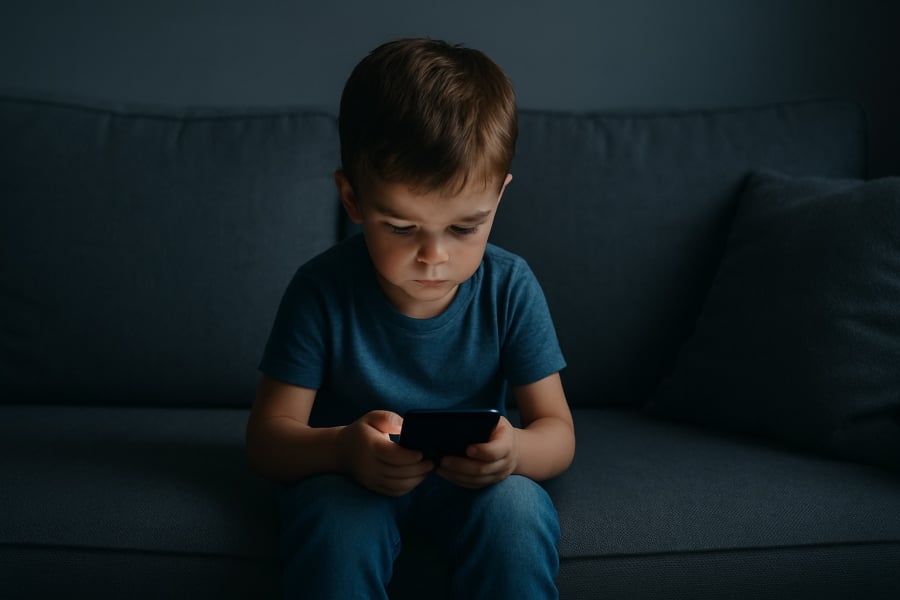When the Phone Becomes an Unwitting Babysitter
I’ve witnessed a similar scene play out countless times: a young boy, around five years old, sits transfixed by his phone’s screen for nearly an hour while his mother catches up with friends nearby, oblivious to his solitude. It’s a familiar and concerning scenario.
In today’s fast-paced world, many parents, overwhelmed or unsure of alternative methods, resort to handing their children a phone as a temporary pacifier. However, the younger the child, the greater the risk. Early childhood is a critical period for brain development, requiring ample real-world interaction.
As PGS.TS Nguyen Thi Minh Thuy, a lecturer at Hanoi National University of Education, warns: “Early and excessive screen time, especially on smartphones, can negatively impact children’s attention, language skills, social abilities, and emotional regulation.”

A Subtle Yet Profound Trade-off
When children become overly attached to their phones, essential activities like running, playing, exploring, and socializing take a back seat. As a result, fundamental life skills, from empathy to self-reliance, are not adequately developed.
A 2023 study published in the Vietnamese Journal of Pediatrics revealed that children who spent more than two hours a day on electronic devices faced higher risks of sleep disturbances, reduced concentration, and behavioral issues.
Renowned educational advisor, GS.TS Nguyen Duc Minh, further emphasizes: “If parents are solely seeking short-term compliance, then phones might seem like a convenient solution. But for long-term success and happiness, intentional parenting is key, and that includes mindful management of technology.”
Breaking Free from Phone Dependency
As a mother who once relied on phones to get through mealtimes, I understand the challenges and consequences: increased irritability, decreased focus, and technological dependence. Instead of self-reproach, I chose to take proactive steps towards change:
- Cultivating Daily Communication: Dedicate at least 30 minutes daily for uninterrupted conversation with your child, free from phone distractions. This could be during mealtimes, story-reading, or simply sharing about your day.
- Encouraging Real-World Exploration: Take your child outdoors to parks, enroll them in extracurricular activities, or even just explore your neighborhood. These experiences foster learning and growth through real-world interactions.
- Modeling Healthy Habits: Children learn by imitation. If parents are constantly on their phones, it’s challenging for children to unplug. Start by setting aside phone-free evenings and gradually establish “tech-free” hours together.

When is the Right Time to Introduce Phones?
According to the World Health Organization (WHO), children under five years old should not spend more than one hour per day in front of screens, with less being preferable. Additionally, children under two years old should have no screen time at all.
However, a 2023 survey by Vietnam’s Ministry of Education and Training revealed a contrasting reality: 71% of Vietnamese parents admitted to introducing phones to their children before the age of seven, primarily to keep them occupied.
This discrepancy between expert recommendations and actual practices underscores a troubling trend.
Conclusion: Success Lies in Simplicity
Providing children with a typical childhood, filled with dirt, sunshine, and carefree afternoons, might be the most valuable gift. Success doesn’t stem from early access to the latest gadgets but from cultivating essential skills like listening, connecting, empathy, and self-confidence.
And Happiness?
Perhaps happiness is found in the laughter shared during a screen-free game, a moment when mother and child connect through a timeless activity that speaks to the heart.
“4 Behaviors That Indicate Overly ‘Innocent’ Parenting: Protect Your Child From Bullying”
A child who is overly meek may become a target for bullies. It is important for parents to recognize the signs of an overly submissive personality and take steps to empower their child. This may include encouraging them to stand up for themselves, teaching them assertiveness skills, and boosting their self-esteem. By helping their child develop a healthier sense of self-worth, parents can reduce the risk of them becoming a victim of bullying.
“Infographic: 9 Fun and Educational Holiday Activities for Kids”
Parents, are you looking for ways to engage and connect with your children during the weekends or holidays? It’s important to choose the right activities and games that are not only fun but also educational and age-appropriate. As a savvy parent, you understand the significance of quality family time and the impact it can have on your child’s development. By selecting the perfect games, you can create memorable moments and foster a loving and nurturing environment for your little ones.


































